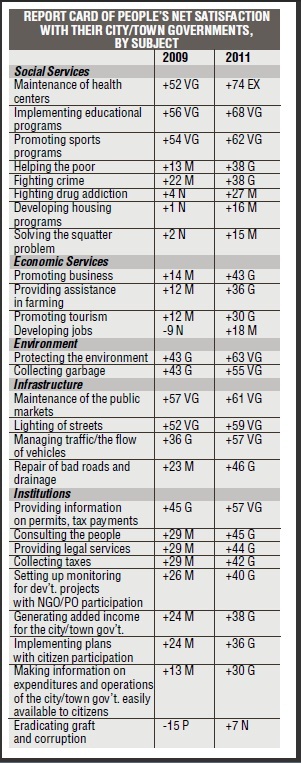Jesse Robredo’s governance legacy
Together with the nation, Social Weather Stations grieves for the tragic loss of the outstanding Filipino Jesse M. Robredo, and condoles with his widow Leni and the bereaved family.
My sole vignette about Secretary Jesse is that I met him once, at a breakfast meeting of the executive committee of the Bishops-Businessmen’s Conference, to whom he very modestly explained his governance principles. It surprised me that he accepted our invitation personally, to meet a mere dozen people, when sending a deputy would have been quite acceptable.
SWS’ apt testimony about Secretary Jesse is its data showing thorough improvement in the people’s satisfaction with local governance between September 2009 and July 2011, after he had been interior and local government secretary for merely a year.
Article continues after this advertisementIn “The 2011 survey on local governance” (Inquirer, 10/15/2011), I reported that, when SWS surveyed household heads in 2011 as to whether the transactions and procedures of their city/town are clear and understandable, 38 percent answered “definitely” and 34 percent said “somewhat,” or a total of 72 percent affirming transparency. Let me now add that, in 2009, 23 percent said “definitely” and 35 percent said “somewhat,” or a total of only 58 percent.
Last year’s piece also noted the rise in the people’s net satisfaction (percent satisfied minus percent dissatisfied) with the general performance of their city/town governments: “The change was largest in the Visayas, from a ‘moderate’ +28 in 2009 to a ‘very good’ +64 in 2011. The Balance of Luzon’s ‘good’ +48 in 2009 became a very good +65 in 2011. Mindanao’s very good +53 in 2009 rose further to +60 in 2011.” (The 2011 survey excluded Metro Manila, by agreement with the collaborating partner, the Department of Interior and Local Government.)
It also summarized the 2011 “report card” of the people’s evaluation of their city/town governments on 30 specific subjects, by grouping them into Excellent (net satisfaction of +70 and up, abbreviated EX), Very Good (+50 to +69, VG), Good (+30 to +49, G), Moderate (+10 to +29, M), and Neutral (-9 to +9, N, which I also referred to as “mediocre”).
Article continues after this advertisementHowever, last year’s column neglected to compare the report cards of 2009 and 2011. The proper comparison is in the table at right. It shows that the people’s appreciation of their city/town governments improved on every one of the 27 subjects included in both surveys. (The table also includes the category Poor or P, for grades of -10 to -29, which was applicable to two subjects in 2009.)
The numbers in the table speak eloquently for themselves, as empirical evidence of Jesse Robredo’s governance legacy.
On every subject, the grade improved from 2009 to 2011. In 23 of the 27 subjects, the grade progressed not just by a few points, but to an altogether higher category. The two negative grades of 2009, on developing jobs and fighting corruption, turned positive in 2011.
Incidentally, the 2011 survey also added three subjects not graded in 2009, namely: Processing papers such as permits, etc. (+63 VG), Being prepared for natural disasters (+49 G), and Fighting illegal gambling (+16 M).
* * *
The SWS 2011 Local Governance survey was done on July 21-25 on representative samples of 400 household heads each in Balance Luzon (i.e., outside Metro Manila), the Visayas, and Mindanao, plus 300 specifically in the Autonomous Region in Muslim Mindanao, or 1,500 in all. The earlier survey was done on Sept. 26-29, 2009, on a national sample of 1,200 household heads. A new Local Governance survey for 2012 is presently in the field, and will extend the survey records of Jesse Robredo’s legacy.
* * *
Contact SWS: www.sws.org.ph or mahar.mangahas@sws.org.ph.

















